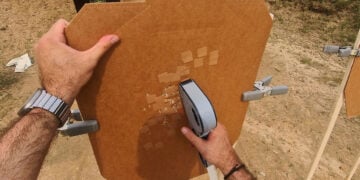The other day I had a doctor’s appointment and when sitting in the waiting room I thought to myself, “I wonder who my doctor goes to when he’s sick.” I thought the same thing when sitting in the barber’s chair about my barber. “I wonder who cuts my barber’s hair.” Of course, my mind wandered to that of lawyers, and clergy leaders. Who do these people go to when they require the same service I am going to them for? I think you can see where I am going with this one. Who do firearm instructors go to when they require firearm instruction? Well, the obvious answer is, “to another instructor.” But sadly that just is not the case. Why is that? If even a doctor has a doctor, why wouldn’t a firearms instructor have an instructor? I think the answer is found not in their abilities to teach, but in their abilities to learn.
I realize this looks like an article that only pertains to instructors but I promise it will be beneficial to all those who are considering formal training as well.
I can honestly say that in the time I have spent as an instructor, I have seen my fair share of students who come into a class just to get a certificate, or they’re there because their agency made them, or they were required to attend in order to get a pistol permit. They have no interest at all in actually learning anything. Unfortunately, that same type exists with those who endeavor to be an instructor. They have the mindset of “Yeah. Yeah. Yeah. Just get this certification over with so I can teach it the way I want.” Or they get the certification and never teach another class again because to them it’s nothing more than a medal. They renew their certification just in case they need to show it off in the near future. “Now hold on there buddy. You just happen to be talking to a certified instructor;” as they fight through their wallet to pull out their renewal card proving their credentials. Now I know that sounds a little judgmental and arrogant, but my authority doesn’t come from any credentials, it comes from experience. Not experience as an instructor, but as a student. See I was a great student long before I was ever a good instructor. As a matter of fact, I still am a better student than I am an instructor. I can honestly say that because I am still getting formal instruction to this day. You see the most important question a student could ask their instructor when interviewing them isn’t when the last time was they taught a class; it is when the last time was they took a class.
In my first few classes as an instructor, it took me a while to sort the ones who were there to learn from those who weren’t. But now I can see them coming from a mile away. I remember two specific incidents that opened my mind to these kinds. The first was during one of the times I retook the NRA Personal Protection Outside the Home Course as a student. The instructor of that class (an NRA training counselor) informed me of the actions of another counselor while at an NRA development seminar in Virginia where they were implementing the newly added holster purse presentation into the curriculum. He said that this fellow counselor made the statement out loud that it was “dumb the NRA was asking women to blade their body to the target before presenting the pistol and that the NRA was too concerned with safety.” He continued with, “I would never teach that nonsense.” Well after the next break he involuntarily didn’t return to the class. After hearing that I couldn’t believe that someone had the fortitude (or foolishness) to actually say that in an NRA counselor development course! But what really made my mouth hit the floor was when a fellow student of mine, sitting right next to me in fact, responded to that story with, “he should have just kept his mouth shut and taught it that way later.” In my opinion, it takes more guts (or stupidity) to say that! Certified instructors (at least not self-certified) do not have the right to teach what they want after getting certified. We didn’t spend the massive amount of time and money to gather the vast resources to develop the course, nor to collect the information necessary to validate what is most safe and what is most proficient in the first place! We would do well to heed to that simple truth before our pride puts us in a place of liability we didn’t sign-up for.
The other incident I won’t soon forget was when I was teaching the NRA Personal Protection Inside the Home Course and had two NRA certified instructors, a married couple, taking the class. At first, I was excited to see fellow instructors continuing their training. But that soon dissipated when I got the sense from them they weren’t really there to learn. When we broke into groups to review some things learned in the Basic Pistol class, I was blown away that these “instructors” couldn’t answer some of the simple questions that the other students had no problem with. It was no wonder to me when I asked them when the last time was they taught a class they couldn’t remember. I was even less amazed when I noticed the wife couldn’t shoot at all and the husband did not like me helping her out. I later found out they wanted to advance their certification to that course as well but their training counselor made them take the full course first. I just couldn’t believe instructors like that actually existed. And if they exist in my small geographic outreach, then they exist elsewhere too.
The NRA emphasizes in all of its courses that the student must learn and adapt to the proper “knowledge, skills, and attitude” before passing the course. So with these types of students (and yes the majority of them are men), I really spend a lot of time working on their attitude to get it up to par with their, supposed, knowledge and skills. It’s easy to do this when you know what it’s like to sit in their chairs. You know what it’s like to be taught by someone else. You know what you have to do to get the most out of the class – because you remember doing that and you are continuing to do that. You never stopped learning. The confidence your students will gain from your seemingly supernatural understanding will be priceless. I never looked at my certification as a credential. I looked at it as a responsibility; a higher standard. My certification motivated more than ever to keep learning. It was my duty to do so. Of the over 100 instructors I know, perhaps 20 still signup (and pay) for additional courses. Even less than that are humble enough to take the actual courses they teach with another instructor. Even less than that can make it through the entire course without having to announce or make it known to anyone there that they are an instructor. If you can personally identify with whom I am describing that there is no better time than now to start practicing what you ask your students to do every class – be a good student. Let me encourage you to stay with me as I cover some key points in the development of the most neglected attribute of firearm safety and proficiency – attitude.
Imagine a doctor who believes they are sick and starts diagnosing him or herself. They start reading up on their sickness in the privacy of their own home, using their own medical books and writing their own prescriptions. They might even jump on WebMD and see what it says. Not only is that ludicrous, but it is also illegal in some jurisdictions. If that was your doctor and you found out about that kind of practice, would you still be comfortable with them? It is no different then when someone watches a lot of YouTube videos and/or reads a lot of articles online (eh hmm) in the privacy of their own home, picks up something they haven’t learned before, and goes out with the false confidence they know what they are talking about and might even start butting in on any conversation around them involving guns because everyone could benefit from their “wisdom.” Even worse, they disseminate this new found information to paying customers who entrust that they are receiving outstanding firearm instruction simply because they are an “instructor.” Trust me, anyone can write an online article and post an online video just as easily as anyone can read them. It is imperative to understand that online videos and articles do not take the place of formal, personal, live, non-free, instruction. They might be great supplemental sources of information but will never alone bring true advancement of your knowledge, skills, and attitude. They are to your improvement as textbooks are to college students – simply an aid to instruction, and an invaluable one at that.
Back to the doctor analogy, just as doctors have their own doctors, their family members each have their own doctor too. There is a reason doctors do not diagnose their own family members. They are too emotionally involved to be objective, and too familiar with them to see the symptoms. I can only imagine what would happen if a doctor diagnosed his wife that since her last appointment, she has gained weight, her blood pressure has increased, her cholesterol levels are up, her percentage of body fat has heightened, there has been some loss of hearing and too much stress in her life. I am sure she would rip up his prescription for treatment and write one for divorce. No, wise doctors make their family members get their own doctor too. Well, the same goes for those out there who just wish that their spouse would listen to them about how to shoot because they know what they are talking about. Look it, you just might know what you’re talking about, but before you take offense to the fact that your spouse won’t take any instruction from you, think about the doctor analogy. You should be excited that your spouse wants to get instruction at all. But let them have their own instructor too; even if you are an actual, certified instructor.
I recently held my first ever “women only” class for the NRA’s Basic Pistol Shooting Course and it had the most positive feedback from the ladies who participated. They all shared their frustrations with their husbands and said it was a relief to them with how patient I was and understanding of their needs. I jokingly replied, “My wife never said that when I tried to teach her!” But as they say, there is truth in humor. Teaching someone how to be safe and proficient with a device that was primarily designed to inflict injury to persons, animals, and/or property without coming across too assertive, enforcing, and narrow-minded is difficult already. Doing so with someone who has a mental list of mistakes, offenses, and faults on you make it near impossible.
Here are some simple things you can do as a student to make sure you make the most out of your experience with professional firearms training:
- Keep in mind that you are paying for this service. Get your money’s worth. Interview your instructor. Purposely call or email him or her multiple times to see how available they are. See how personable they are on the phone or in their emails. Get an idea of how comfortable you will be with them. Come prepared with questions already written down you would like answered.
- Don’t isolate yourself during the class. Purposely sit next to others so to form a “buddy” throughout the class. Even though you might not be in a lot of the group exercises together, you can talk during the breaks about your experiences.
- Get a good night’s sleep and bring plenty of quiet snacks and simple drinks to enjoy during the class. It will help keep you focused.
- Take notes. You only remember half of what you see and half of what you hear, but you will remember three-quarters of what you write down. Also, you will be able to put it in your own words to help you when the class is all over with.
- Take note how much your instructor is willing to demonstrate in front of you. It is not good enough to just lecture or regurgitate what they know; they need to be able to show you. I understand a basketball coach in his 50’s can’t throw as good as his star player in his early 20’s, but he better be willing to throw anyway. Avoid those kinds of instructors at all costs. They fear to make a mistake in front of their students more than anything else and that is usually a good sign they are like the self-diagnosing doctor. Your instructor should be able to use any publicly made mistakes as tools for teaching.
- Remember to respect your instructor the way you would want to be respected if you were charged with leading the class.
- And last but not least: enjoy yourself!
That is all for now. Be safe out there.









